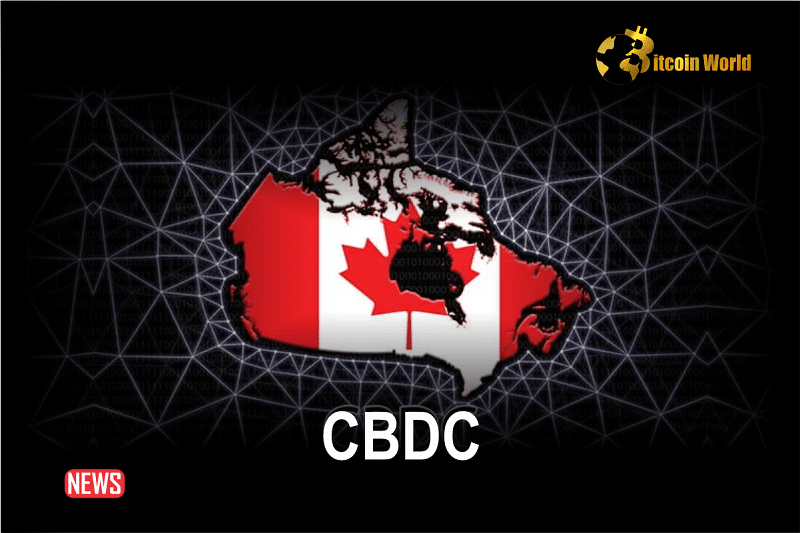Imagine a future where your Canadian dollars exist only as digital entries, managed by the Bank of Canada. Sounds futuristic, right? Well, Canada has been exploring this very concept – a Central Bank Digital Currency (CBDC), often called the Digital Canadian Dollar. But here’s the surprising twist: despite knowing about it, Canadians aren’t exactly jumping for joy at the idea. In fact, a recent public consultation revealed a significant wave of reluctance. Let’s dive into why Canadians are seemingly hesitant to embrace the digital dollar and what this means for the future of money in the Great White North.
High Awareness, Low Enthusiasm: The CBDC Paradox in Canada
You might think that in our increasingly digital world, a digital form of national currency would be welcomed with open arms. And indeed, awareness isn’t the issue. The Bank of Canada conducted a public consultation, and guess what? A whopping 95% of the over 89,000 respondents were already aware of the concept of a Digital Canadian Dollar! That’s almost everyone! This high level of awareness should be a green light for adoption, right? Not so fast.
- High CBDC Awareness: Nearly everyone in Canada is aware of the Digital Canadian Dollar concept.
- Low CBDC Adoption Desire: Despite awareness, there’s a significant reluctance to actually use it.
- Cash is Still King: Canadians overwhelmingly prefer cash for daily transactions.
- Crypto-Savvy Exception: Individuals familiar with cryptocurrencies are more open to the idea of a CBDC.
These points, highlighted from the Bank of Canada’s “Digital Canadian Dollar Public Consultation Report”, paint a fascinating picture. While Canadians are informed, they’re not necessarily convinced. Let’s break down the key reasons behind this surprising reluctance.
Why the Hesitation? Canada’s Love Affair with Cash
The report reveals a fundamental truth about Canadians and their money: they love cash! A staggering 93% of respondents reported using physical currency for their daily transactions. Think about it – from your morning coffee to weekend farmers’ markets, cash is still deeply ingrained in Canadian life. This strong preference for physical money highlights a key challenge for the Digital Canadian Dollar. Awareness doesn’t automatically translate into adoption, especially when people are perfectly content with their current options.
The survey results were clear: Canadians aren’t clamoring for a digital alternative. In fact, a significant portion of respondents actually advised the Bank of Canada to halt its research and development into the Digital Canadian Dollar altogether! This strong pushback indicates a satisfaction with existing payment methods. Credit cards, debit cards, and various online payment platforms already cater to many Canadians’ needs. So, the question arises: if it ain’t broke, why fix it?
See Also: Alchemy Pay Introduces New Ways To Buy Crypto In Europe And The UK
The Awareness Paradox: Knowing More, Wanting Less?
Here’s where things get really interesting. The consultation revealed a counter-intuitive finding: Canadians who were already aware of CBDCs were actually more resistant to adopting them compared to those with less knowledge. This is a crucial insight! It challenges the common assumption that simply educating the public will automatically lead to acceptance of new technologies, especially in the realm of finance.
Perhaps increased awareness also brings increased scrutiny and questions. Concerns about privacy, security, and control might become more prominent as people learn more about CBDCs. This “awareness paradox” suggests that the Bank of Canada faces a more complex challenge than just informing the public; they need to address the underlying concerns that awareness might actually amplify.
A Glimmer of Hope: Crypto Holders and CBDC Curiosity
It’s not all resistance, though. The report also highlighted a segment of the population that showed more openness to the Digital Canadian Dollar: cryptocurrency holders. Individuals who have already dabbled in digital assets like Bitcoin are more likely to be receptive to the idea of a CBDC. This makes sense. They are already familiar with the concepts of digital currency, digital wallets, and the potential benefits and challenges of a digital financial system.
This suggests that while mainstream Canadians might be hesitant, those already comfortable in the digital asset space see potential in a CBDC. This group could be early adopters and potentially help bridge the gap towards wider acceptance in the future.
See Also: Beware: Squid Game Token Has Re-Emerged Amid Netflix Hype
The Future of the Digital Canadian Dollar: What’s Next?
The public consultation results present a mixed bag for the Bank of Canada. On one hand, widespread awareness is a positive starting point. But on the other hand, the strong preference for traditional payments and the resistance from those already informed about CBDCs pose significant hurdles.
Will the Bank of Canada heed the public’s concerns? The consultation report suggests that Canadians themselves are skeptical about whether their feedback will truly influence the central bank’s decisions. Whether these preferences will be taken into account remains to be seen. The future of the Digital Canadian Dollar hinges on how the Bank of Canada navigates this apparent public reluctance and addresses the valid concerns raised by Canadians. One thing is clear: convincing Canadians to ditch their beloved cash for a digital alternative will be a marathon, not a sprint.
Disclaimer: The information provided is not trading advice. Bitcoinworld.co.in holds no liability for any investments made based on the information provided on this page. We strongly recommend independent research and/or consultation with a qualified professional before making any investment decisions.
Disclaimer: The information provided is not trading advice, Bitcoinworld.co.in holds no liability for any investments made based on the information provided on this page. We strongly recommend independent research and/or consultation with a qualified professional before making any investment decisions.




